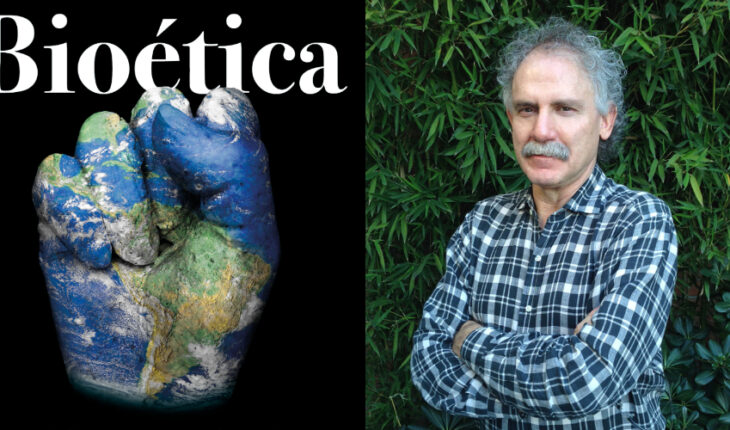Given the constant threats to biodiversity in the world during the last five decades, a series of people dedicated to science and the arts in Mexico meet to analyze the current state of health of the planet, from the point of view of bioethics and its challenges in the XXI century, in the book Bioethics: Manifesto for the Earth (editorial Debate, 2022).
Manifesto for the Earth, has a series of essays written by 13 specialists in medicine, music, economics, politics and religion that are part of the Seminar of Mexican Culture with the exception of Dr. José Sarukhán, who in the prologue, emphasizes the need to create bridges to the future where human beings, in their evolutionary need, connect more with nature and respect for it.
Arnoldo Kraus, doctor and writer, who was in charge of coordinating the 13 texts that make up this Manifesto for the Earth, He explains that this publication is also a reminder of the first article dedicated to talking about the health of the planet from bioethics.
51 years ago, Kraus recalls, the American biochemist Van Rensselaer Potter published Bioethics: Bridge to the future (Prentice-Hall, New Jersey, United States). It is an article that considers how the health of the Earth was. In it, the also professor of Oncology at the University of Wisconsin-Madison, took up the term ‘bioethics’ to make this analysis.
“Concerned about water and air pollution due to population growth and ecological damage, Potter considered that bioethics, supported by knowledge from biology, philosophy, technology and science, should be the instrument to alert humanity to the dangers that lurk on Earth,” writes Arnold Kraus in the book.
The Earth got sicker
However, 51 years later, the health of the Earth has worsened despite the warnings that scientists and specialists have made to humanity to change their habits for activities that help in the restoration of nature.
“If we do not bet that we are all well concatenated with that survival, then when we get sick we make our inner circle sick and we end up with the Earth,” explains Arnoldo Kraus in an interview for Political animal.
To understand why it is important to pay attention to the health of the Earth, Dr. Kraus pointed out in an interview, at least, four essential axes to this issue from bioethics and that are within the book Manifesto for the Earth.
1. What is bioethics?
Arnold Kraus explains that Bioethics: Bridge to the future is also a publication dedicated to Aldo Leopold, who was an American ecologist and environmentalist who was dedicated to caring for the environment in his country. He, at some point 70 years ago, pointed out that the human being is the cancer of the earth. “He said it like that, you know it and I know it. We see it every day,” he says.
“Bioethics is something that is connatural to us. Bioethics is the philosophy of the twenty-first century and I summarize it briefly by stealing words from Dr. Potter: bioethics is the science of survival and here I expand the concept of my survival —as a person— that of my family around me, that of my neighborhood, of society, of the country and, from there, to Earth,” Kraus adds.
2. Listen to scientists
Kraus explains that in 2022 alone there were countless natural tragedies, for which everyone who inhabits the planet is responsible. Therefore, the book Manifesto for the Earth, aims to spread a little the responsibility that people have with the planet.
“Nature does not belong to us. We are a fragment of it and humanity is a fragment in the history of the Earth and the Universe. So, we have done very wrong thinking that the Earth is ours. We don’t listen to people who know,” he adds.
For at least 70 years, scientists and specialists in climate change and the environment have warned about the consequences of the human footprint on nature that has led to a gradual destruction of the Earth.
3. Worry about assisting people
In a look at the consequences that have derived from the constant exploitation of nature, natural resources, flora and fauna on Earth, Kraus emphasizes the texts that make up Manifesto for the Earth where 13 specialists analyze how the health of the planet has been in the last three decades.
“I don’t remember so much (what Tie was like).rra 50 years ago) because I did not have so much awareness at that time, but as I have increased years in my life, I would say that when I was 20 or 30 years old I did not care about these issues. They were not issues that one discussed for the simple reason that the Earth was not threatened, as it is today,” he says.
Kraus calls on the readers of this work and calls for community action not to allow the world to continue with this bad course and encourages “we care about assisting people who do not have (enough) resources.”
4. Stop plasticizing
The specialist also talks about plasticization and how the lack of regulation of the production and excessive use of plastics on the planet adds to its critical state that puts the health of the Earth in crisis and where the countries that pollute the most and destroy the most, are the nations that have the most resources or emerging countries with a brutal capacity, like China, the United States, Russia – from the bioethical point of view. Meanwhile, those who turn out to be most affected are people in poor countries.
In a text entitled ‘The plasticization of the world’, recently written by Arnoldo Kraus, he talks about the amount of plastics that invade, today, people and the misuse that is given to them in an economy – still – linear. “They sell us the idea that they are recycled and reused. It’s fake.”
Read more |#EnvíoSinPlástico: an NGO urges the CDMX to regulate the use of plastics in e-commerce
“It’s a completely false idea. Very little is recycled because the people who want and who make plastics of any kind are easier to do than to recycle and there, we become accomplices of accepting that. We become unconscious beings when we are buying plastic bottles,” warns the health specialist.
In the report From pollution to solution: a global assessment of marine litter and plastic pollution of the Environment Program of the United Nations (UN), warns that, until 2021, plastic represented 85% of the waste that reaches the oceans and, by 2040, the volumes of this material that will flow into the sea will almost triple with an annual amount of between 23 and 37 million tons, that is, almost 50 kg of plastic per meter of coastline worldwide.
Such plastics “end up in landfills in poor countries or end up in the sea. How many photos and videos have we seen of turtles dying because they are rolled up in plastics, how many birds or fish die because they swallow coffee capsules. In short, we see it all the time and carelessness prevails, consumerism prevails, not realizing that we are not the owners of the world, but that we act as if we were and we spend it attacking the earth, “he emphasizes.
What we do at Animal Político requires professional journalists, teamwork, dialogue with readers and something very important: independence. You can help us keep going. Be part of the team.
Subscribe to Animal Político, receive benefits and support free journalism#YoSoyAnimal





